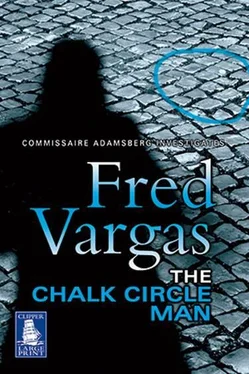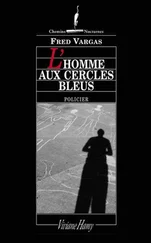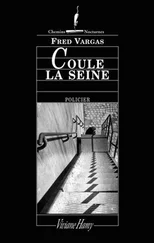‘I don’t really know what to say,’ said Le Nermord, looking rather disorientated. ‘What exactly are you asking me?’
‘Well, how do you explain it?’
‘I don’t know! I never realised I left any smell behind me. It’s rather humiliating, in fact, to learn this.’
‘I have a suggestion. Perhaps it comes from outside your house, from some other cupboard where you used to leave the clothes you wore when you were being the circle man.’
‘My clothes when I was “being the circle man”? But I didn’t wear anything special! I wasn’t demented enough to dress up for my outings! No, commissaire . Your witnesses will surely have said that I was dressed in ordinary clothes, like I am today. I wear practically the same things every day: flannel trousers, white shirt, tweed jacket, raincoat. I hardly ever dress any differently. Why on earth would I go out wearing a tweed jacket and go “somewhere else” to put on another tweed jacket, especially one that smelled odd?’
‘That’s exactly what I was wondering.’
Le Nermord was looking miserable again and Danglard felt vexed with Adamsberg once more. In the end the commissaire wasn’t so bad at torturing his suspects.
‘I do want to help you,’ said Le Nermord, his voice on the point of breaking, ‘but that’s asking too much. I don’t understand this business of a smell and why it’s so interesting.’
‘It may not be as interesting as all that.’
‘Perhaps, you know, it might have something to do with nervousness, because these circles were a very emotional thing for me. Maybe I was giving off a sort of “smell of fear”? I suppose it’s possible. When I was in the metro afterwards, I’d be dripping with sweat.’
‘It really doesn’t matter,’ said Adamsberg, scribbling on the table. ‘Forget it. I get these ideas fixed in my head and they don’t mean anything. I’ll let you go, Monsieur Le Nermord. I hope you find some peace in the countryside. People say it’s possible.’
Peace in the countryside indeed! Danglard, infuriated, gave a snort of exasperation. Everything about the commissaire was getting on his nerves this morning, his aimless meanderings, his pointless questions and his banal remarks. Oh, for a glass of white wine. Too early, much too early, control yourself for heaven’s sake.
Le Nermord gave a tragic smile and Danglard tried to cheer him up a bit by shaking his hand warmly. But Le Nermord’s hand remained limp. A lost soul, Danglard thought.
Adamsberg stood up and watched Le Nermord go down the corridor, stooping slightly and looking thinner than ever.
‘Poor sod,’ said Danglard. ‘He’s finished now.’
‘I’d have preferred it if he had been diabetic,’ was Adamsberg’s only reply.
Adamsberg spent the rest of the morning reading Ideology and Society under Justinian . Danglard, feeling almost as exhausted as his victim after the long joust with the chalk circle man, would have liked Adamsberg to stop thinking about him and move the investigation on in some other direction. He felt so saturated with Augustin-Louis Le Nermord that the last thing in the world he wanted to do was read a line he had written. Out of every page, the cloudy blue gaze of the Byzantine scholar would have seemed to stare at him, reproaching him for his persecution.
Danglard came to find Adamsberg at one o’clock. He was still plunged in his book. Danglard remembered that the commissaire had told him that he read slowly, one word after another. He did not look up as he heard Danglard come in.
‘Do you remember that fashion magazine we found in Madame Le Nermord’s handbag, Danglard?’
‘The one you were looking at in the van? Must still be in the lab.’
Adamsberg called the lab and asked for the magazine to be sent down if they had finished with it.
‘What’s bothering you now?’ asked Danglard.
‘I don’t really know. But at least three things are on my mind. The smell of rotten apples, the good doctor Gérard Pontieux, and the fashion magazine.’
Adamsberg called Danglard back in a little later. He was holding a small piece of paper.
‘Here’s the train timetable,’ Adamsberg said. ‘There’s one leaving in fifty-five minutes for Marcilly, the native heath of our Dr Pontieux.’
‘What bothers you about the doctor?’
‘He bothers me because he’s a man.’
‘Still on about that?’
‘I told you before, Danglard. My mind works slowly. Do you think you could catch this train?’
‘Today? Now?’
‘If you would. I want to know everything about this doctor. You’ll find some people there who knew him in his younger days, before he set up his practice in Paris. Ask them about him. I want to know all about him. Absolutely everything. We’re missing something here.’
‘But how can I ask questions if I haven’t the slightest idea what you want to know?’
Adamsberg shook his head. ‘Just go down there, and question anyone you can. I’ve every confidence in you. Don’t forget to phone me.’
Adamsberg waved to Danglard and, looking absent-minded, went downstairs to find something to eat. He chewed his cold lunch as he made his way over to the National Library.
At the reception desk, his shirtsleeves and worn black canvas trousers did not create the most favourable impression. He showed his card and said he wanted to consult the complete works of Augustin-Louis Le Nermord.
Danglard arrived at Marcilly station at ten past six, just the right time for a glass of white wine at a café table. There were six cafés in Marcilly, and he went round all of them, meeting plenty of old people who remembered Gérard Pontieux. But what they had to say held little interest. He was getting bored with the life of the young Gérard, which had apparently been incident-free. It seemed to him that it would have been more profitable to concentrate on his medical career. You never knew: perhaps an assisted death, or a faulty diagnosis somewhere in the past. Anything could have happened. But that wasn’t what Adamsberg was after. The commissaire had sent him here, where nobody knew what had become of Pontieux beyond the age of twenty-four.
By ten o’clock, Danglard was dragging himself round Marcilly on his own, light-headed with local wine and having learnt nothing of substance. He didn’t want to return empty-handed to Paris. He felt he should keep trying, although spending the night here was not an attractive option. He called the children to wish them goodnight. Then he went to the address that had been given him in the last café, where there was a possible room for the night. His hostess was an old lady who served him yet another glass of the local wine. Danglard felt like pouring out all his woes to this aged but lively face.
WITHOUT TELLING ANYONE, MATHILDE HAD BEEN FRETTING ALL week. In the first place, she had not been best pleased to hear Charles coming in at half past one in the morning, and then learning next morning that another woman had been murdered. And as if to rub salt in the wound, Charles had spent the evening joking maliciously, in a thoroughly aggravating way. At the end of her tether, she had thrown him out of her apartment and told him he could come back when he was in a better mood. It worried her, there was no disguising it. As for Clémence, she had come back very late the same night in tears, and completely distraught. Mathilde had spent a fruitless hour trying to sort her out. Finally Clémence, her nerves shattered, had agreed that it would do her good to have a change of scene. The lonely-hearts ads were very bad for her. Mathilde had approved of this immediately, and sent her back up to the Stickleback to pack her case and take a few hours’ rest. She was cross with herself, because next morning as she heard Clémence tiptoeing downstairs trying not to disturb her, she had thought: ‘Good riddance, four days without having to put up with her.’ Clémence had promised to come back the following Wednesday to finish the classification she had started. She probably guessed that her friend the dressmaker wouldn’t be too keen to keep her longer than that. She was fairly clear-eyed, old Clémence. How old was she, anyway? Mathilde wondered. Sixty, seventy, somewhere in between? Her dark red-rimmed eyes and her unattractive pointed teeth made it difficult to guess.
Читать дальше












